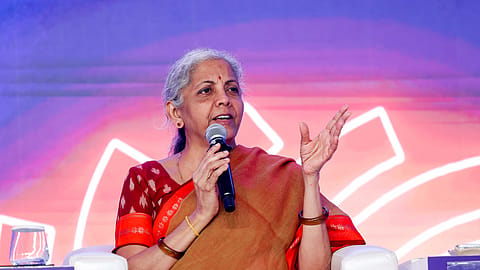Inflation control key to global growth: FM lists out 5 priorities
Sitharaman says India has been able to remain on a higher and sustainable growth path due to the accelerated pace of economic reforms in the past nine years

Union Finance Minister Nirmala Sitharaman has outlined inflation control, capital expenditure, investments in health and education, climate action, and diversification of global supply chains as the five key priorities for sustained global economic growth.
Stating that India has been doing everything within its control to spur growth, the minister says she expects the forthcoming GDP numbers for the first quarter of 2023-24 to show the country doing well in economic growth.
Addressing the ongoing B20 Summit India 2023 on the “Key Priorities for Sustained Global Economic Recovery” in Delhi on August 25, Sitharaman says India has been able to remain on a higher and sustainable growth path due to the accelerated pace of economic reforms undertaken by the central government in the past nine years.
“Reforms have been sporadic before. In contrast, in the last nine years, even during the Covid period, reforms happened because we thought that was an opportunity, rather than a challenge. Wide-ranging domains have been covered, whether it is fiscal, digital, physical infrastructure, or social inclusion,” she says.
The minister points out that taming inflation is absolutely critical for economic growth, as persistently high inflation will weaken demand. “Equally, elevated interest rates for a considerable time can come in the way of economic recovery. The tendency to use interest rates as solution for dealing with inflation has its own downside. So, the task of the central banks is to keep in mind growth and growth-related priorities even as equally looking at controlling inflation. The fiscal deficit also needs to be restrained,” she says.
According to the minister, the second priority has to be an emphasis on investments to spur growth. “That is a sure shot for sustainable growth. An increase in investments in physical assets needs to be substantially raised, driven by the public sector if possible, and complimented by the private sector. The labour force participation and improving productivity simultaneously with increasing investments are essentials to go with it. Labour force participation rate, therefore, will have to increase, for which enabling policies will have to be made,” she explains.
Investments in public health and education along with skilling were pointed out as the third priority.
Recommended Stories
On the importance of climate finance, the minister says that only very few countries, including India, have funded their own commitments given in Paris and fulfilled their nationally determined commitments with their own resources. “We need the money for transition, we need the money for technology as well and if both these are made available, very many countries which are in no position to fund their own climate commitments can also give us positive results. But climate is such a matter that no country on its own fulfilling its goals will suffice. It has to be global action,” she says.
Diversification of supply chains was also highlighted as a key priority for sustained global economic growth. “The world in the next 50-60 years cannot afford one more jolt in the supply chains. Unless we quickly diversify supply chains, well-functioning international markets with resilient and efficient supply chains are the ones that can help us in sustaining growth,” Sitharaman says.
The economic crisis arising out of the handling of the Covid-19 pandemic and lockdown-related disruptions, the impact of the Russia-Ukraine war, food security and energy security-related issues, the transition of fossil fuel to green issues, climate change issues, all are aggravating the concerns of how to sustain growth in the global economy, she notes.